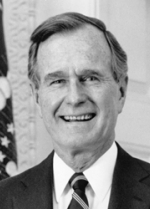President George H.W. Bush

Bush accepted the Legion's Distinguished Service Medal in 1991, telling Legionnaires that the United States must remain strong in every way. "In the 21st century, America must be not only a military superpower," he told delegates, "but also an economicsuper power and an export superpower .... We didn't end the Cold War to make the world safe for trade wars. We must fight the protectionist impulse here at home and we must work with our partners for trade that is free, fair and open."
The last World War II veteran to serve as president, Bush enlisted in the Navy at 18 and became its youngest pilot, flying 58 combat missions. He was shot down over the Pacific, rescued by a U.S. submarine and awarded the Distinguished Flying Cross.
After graduating from Yale, Bush continued his family's tradition of public service in the House of Representatives from 1967 to 1971. President Nixon named him ambassador to the United Nations, a post he held for two years. He also served as chairman of the Republican National Committee, chief of the U.S. Liaison Office to China, and CIA director.
Following an unsuccessful bid for the GOP presidential nomination in 1980, Bush served as vice president to Ronald Reagan for two terms, after which he won the White House and became the nation's 41st commander in chief. During his administration, the Cold War ended, the Soviet Union broke up and the Berlin Wall came tumbling down. Bush sent troops to Panama and launched Operation Desert Storm to liberate Kuwait. In 1992, as the economy struggled, he lost a re-election bid to Bill Clinton.
